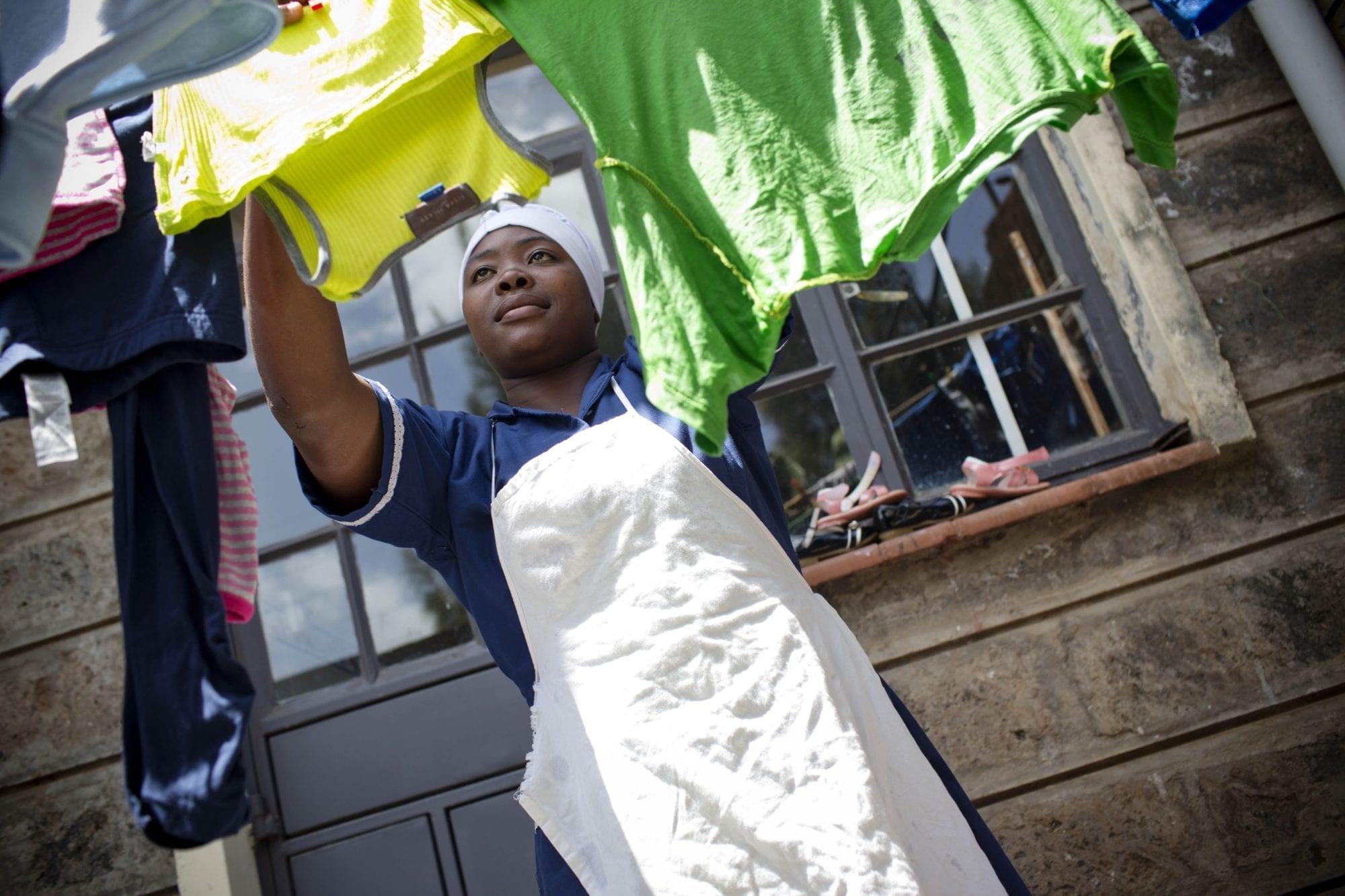
Jul 31, 2018
Around the world, workers, their unions and other associations are striving to promote the rights of working people at their jobs and in their everyday lives.
While every job has value, not all jobs are “good jobs.” Millions of jobs around the world do not offer the social protections or the sense of dignity that allow workers to enjoy the benefits of their own hard work.
The Solidarity Center works with unions and other allies to empower workers around the world to achieve decent work together.
WHAT MAKES A “GOOD JOB”?
In Thailand, Burmese migrant workers and their families learn about their rights on the job through training programs organized by the Human Rights Development Foundation (HRDF), a Solidarity Center ally.
But what are those rights? What makes a job a “good job”?

At the Pae Pla Pier in Mahachai, Thailand, Burmese dockworkers cart barrels of fish. Credit: Solidarity Center/Jeanne Hallacy
GOOD JOBS ARE SAFE
At the Gldani Metro Depot in Tbilisi, Georgia, employees work with dangerous chemicals and face constant danger from high voltage electrical wires. Their union, the Metro Workers’ Trade Union of Georgia (MWTUG), is addressing these safety and health risks with assistance from the Solidarity Center.
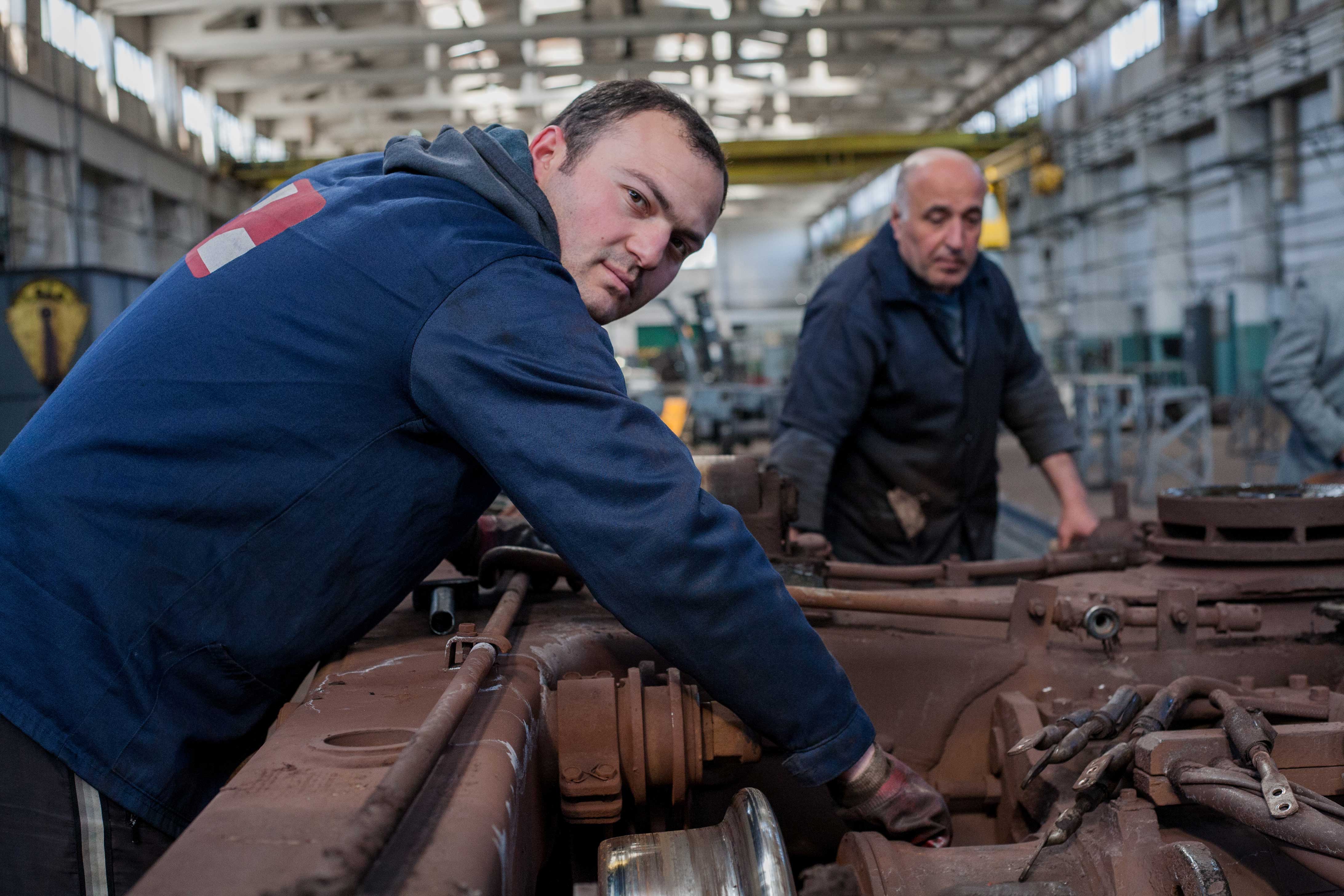
At the Gldani Metro Depot in Tbilisi, Georgia, employees like repairman Tamaz Simonishvili work with dangerous chemicals and face constant danger from high voltage electrical wires—safety and health risks his union, Metro Workers’ Trade Union of Georgia, is addressing with the assistance of the Solidarity Center. Credit: Solidarity Center/Lela Mepharishvili
The Solidarity Center also partners with numerous unions and worker associations in Bangladesh to train garment workers in fire safety and other measures to improve their working conditions.
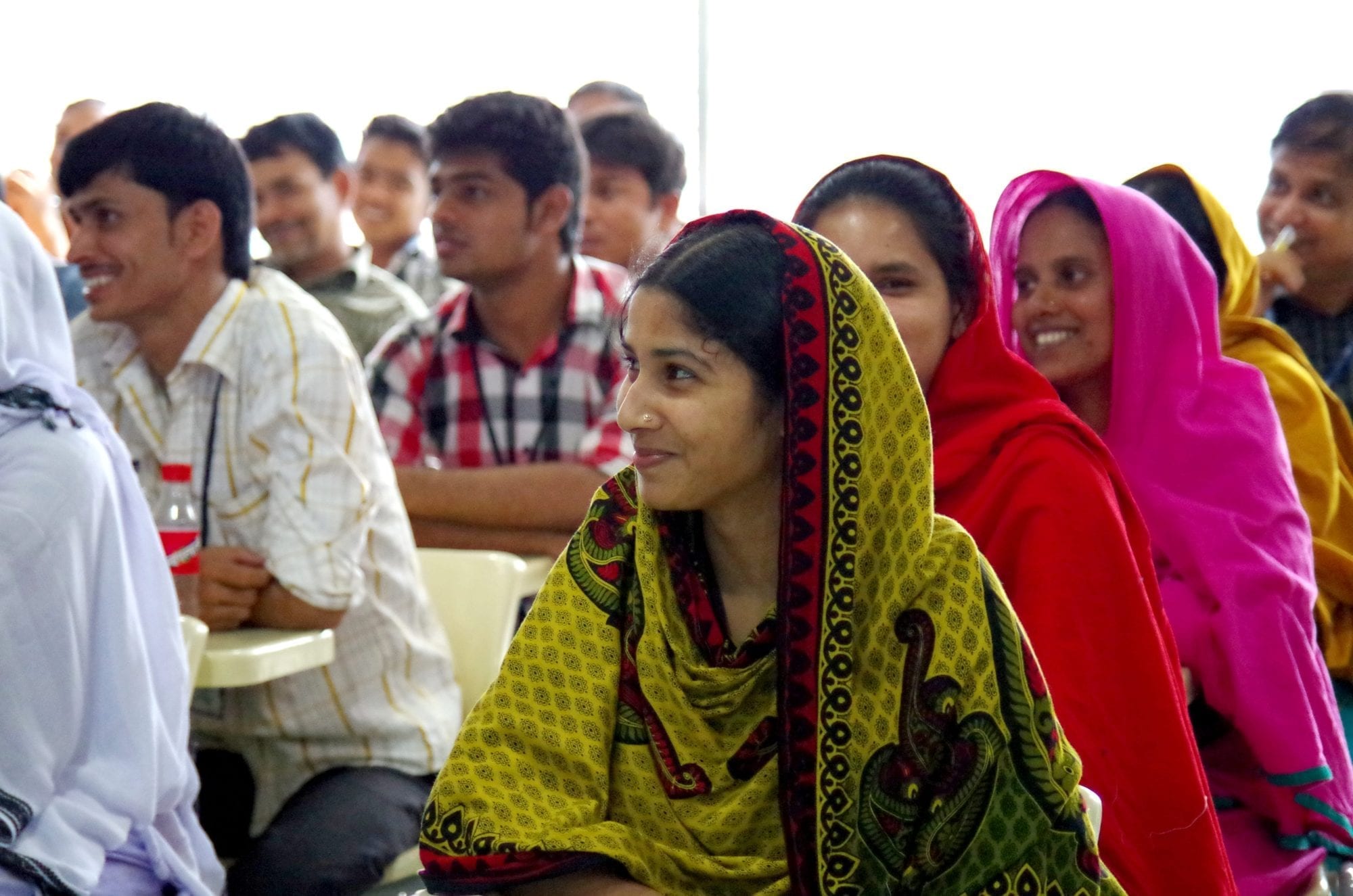
The Solidarity Center partners with numerous unions and worker associations in Bangladesh to train garment workers in fire safety and other measures to improve their working conditions. Credit: Solidarity Center
GOOD JOBS PAY LIVING WAGES
At the Palmas del César palm oil extraction plant in Minas, Colombia, workers are represented by Solidarity Center union ally Sintrapalmas-Monterrey. The union organized subcontracted workers into its bargaining unit, significantly improving their wages, benefits and job conditions.
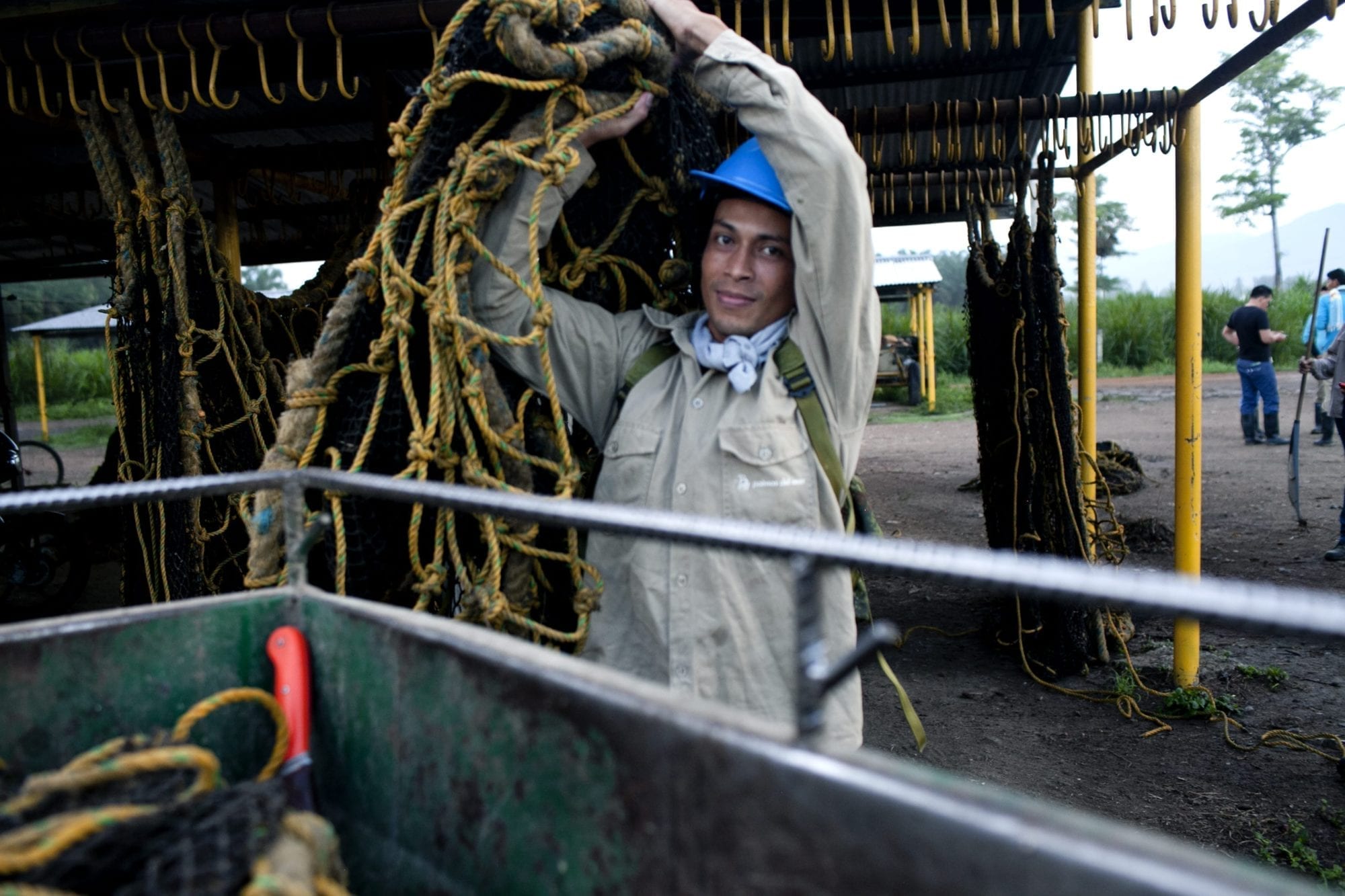
At the Palmas del César palm oil extraction plant in Minas, Colombia, workers are represented by Solidarity Center union ally Sintrapalmas-Monterrey. The union organized subcontracted workers into its bargaining unit, significantly improving their wages, benefits and job conditions. Credit: Solidarity Center/Carlos Villalon
In Sri Lanka, where jobs are shifting from the industrial to service sector, workers like members of Food, Beverage and Tobacco Industry Employees’ Union (FBTIEU) are forming unions in the hotel and tourism sectors to ensure that the new jobs pay living wages and offer social benefits.
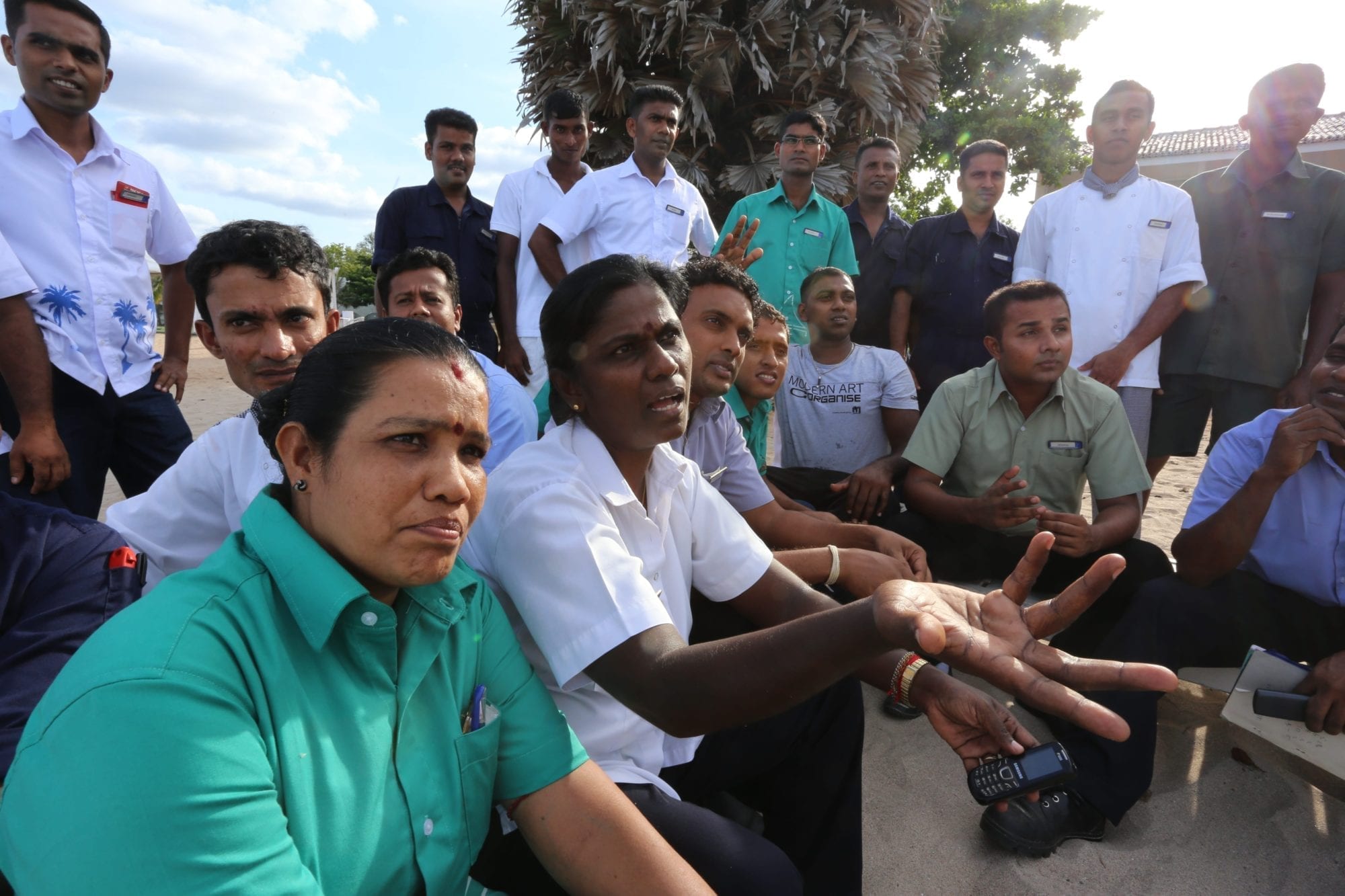
In Sri Lanka, where jobs are shifting from the industrial to service sector, workers like members of Food Beverage and Tobacco Industry Employees’ Union are forming unions in the hotel and tourism sectors to ensure the new jobs pay living wages and offer social benefits. Credit: Solidarity Center/Pushpa Kumara
GOOD JOBS TAKE CARE OF WORKERS
The National Union of Mine, Metal, Steel and Allied Workers of the Mexican Republic (SNTMMSSRM, known as “Los Mineros”) has won many bargaining pacts that include significant economic benefits and essential safety and health protections for workers.
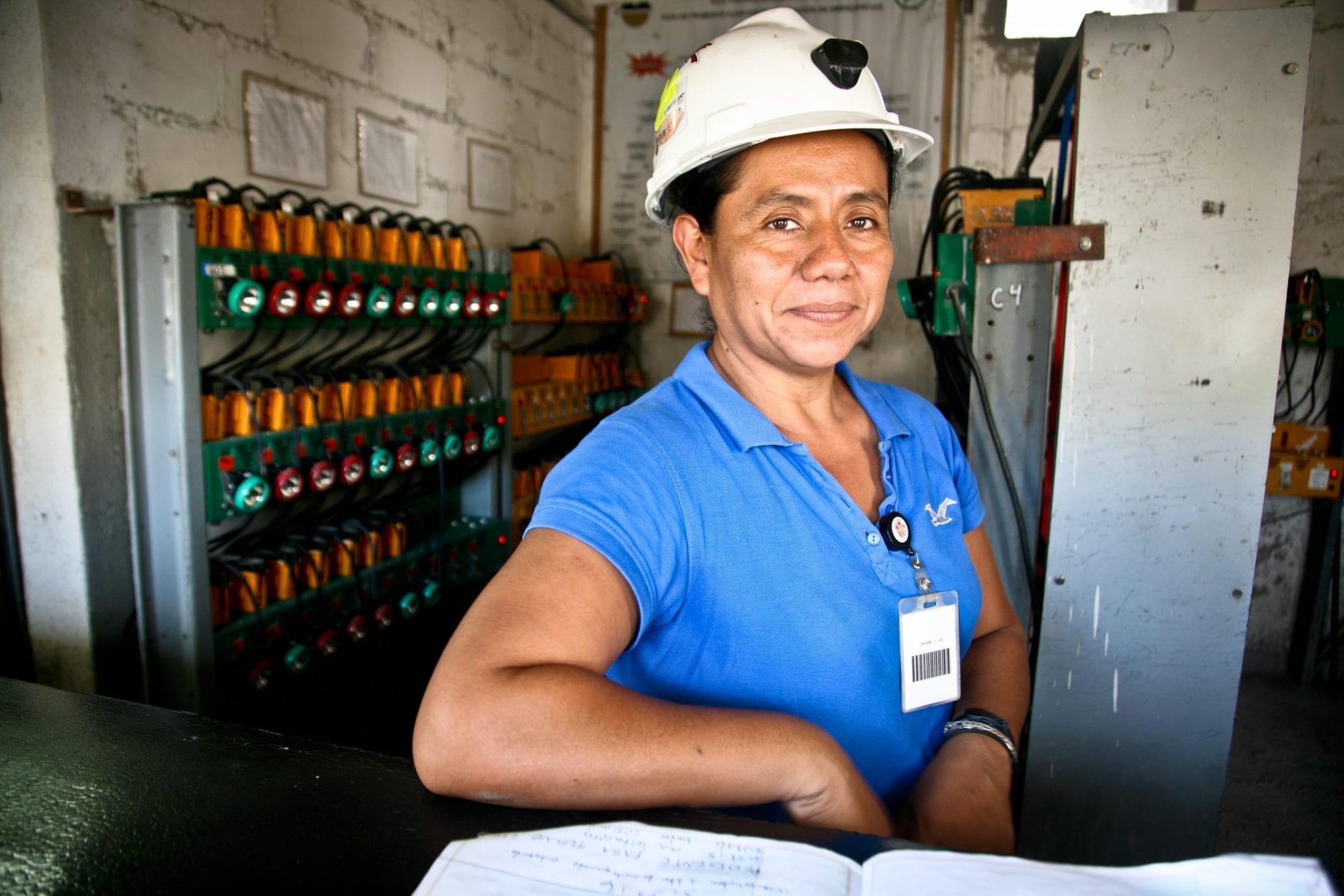
A miner in Mexico’s Baja California Sur, Ruth Rivera also is a shop steward for her union, SNTMMSSRM (Los Mineros), which has won bargaining pacts that include significant economic benefits and essential safety and health protections. Credit: Solidarity Center/Roberto Armocida
Agricultural workers in Rustenburg, South Africa, are members of the Food and Allied Workers Union (FAWU), a Solidarity Center partner, which represents migrant farm workers in Mpumalanga Province and assists them in gaining access to health care and other services.

A FAWU member plants cabbage seedlings on a farm in Rustenburg, South Africa. Credit: Solidarity Center/Jemal Countess
GOOD JOBS GIVE WORKERS A BREAK
Across the Arab Gulf, more than 2.4 million migrant domestic workers often toil 12–20 hour days, six or seven days a week. Domestic workers in Jordan recently formed a worker rights network that advocates for better working conditions and includes migrant workers from Bangladesh, Indonesia, the Philippines and Sri Lanka.

Sri Lankan domestic workers in Jordan defend their rights. Credit: Solidarity Center/Francesca Ricciardone
The Kenya Union of Domestic, Hotel, Educational Institutions, Hospitals and Allied Workers (KUDHEIHA), a Solidarity Center partner, has been at the forefront of championing the rights of domestic workers at the national level and working locally to organize workers into the union and educate them about their rights.
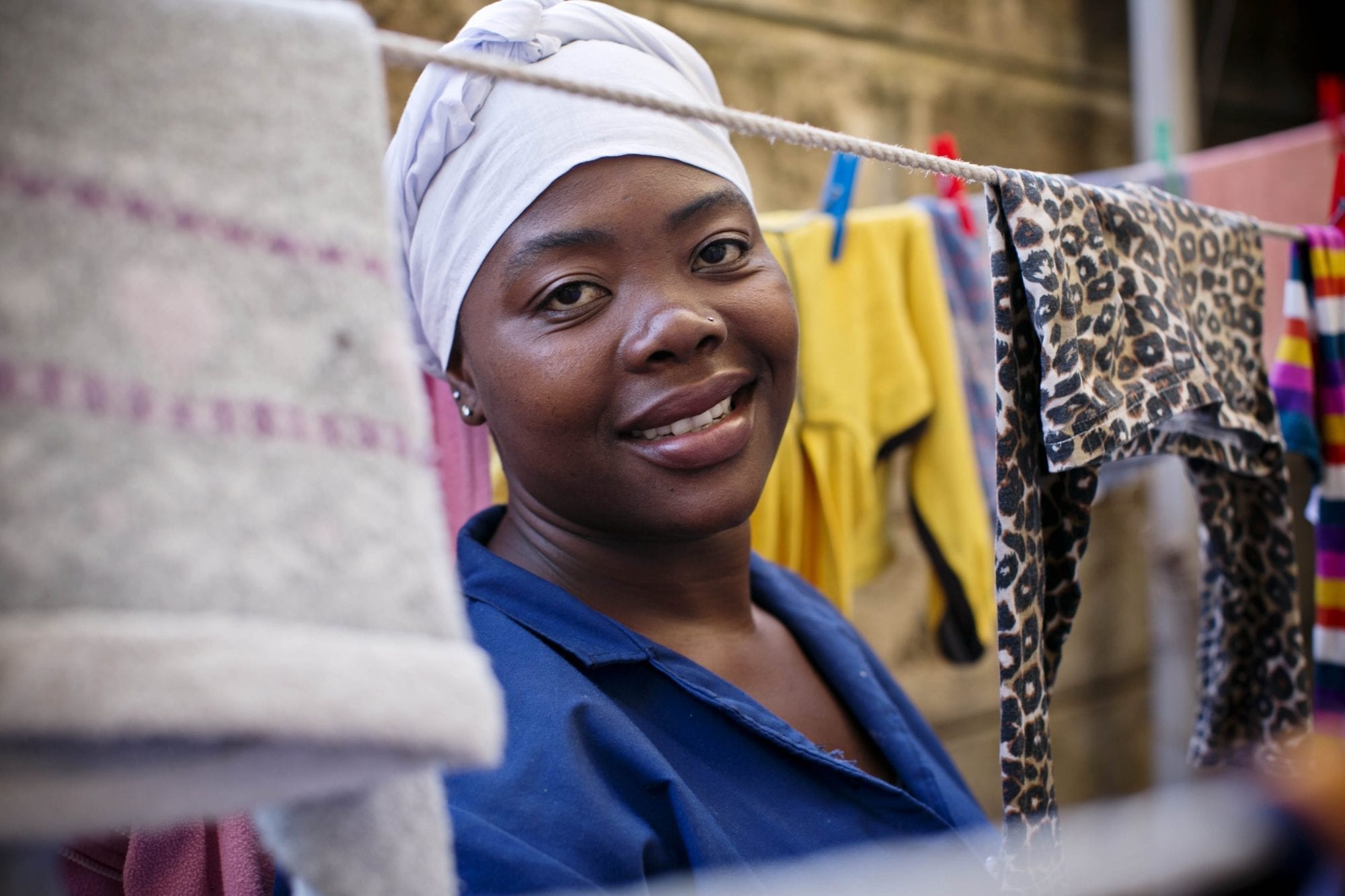
The Kenya Union of Domestic, Hotel, Educational Institutions, Hospitals and Allied Workers union, a Solidarity Center partner, has been at the forefront of championing the rights of domestic workers at the national level and working locally to organize workers into the union and educate them about their rights. Credit: Solidarity Center/Kate Holt
GOOD JOBS EMPOWER WOMEN
Dozens of journalists and media professionals have taken part in the Solidarity Center’s ongoing Gender Equity and Physical Safety training in Pakistan, identifying priority gender equality issues at their workplaces and in their unions, and outlining strategies for addressing those issues.

Journalists in Pakistan participate in Solidarity Center-sponsored gender equality workshops. Credit: Solidarity Center/Immad Ashraf
Through her union, the Palestinian General Federation of Trade Unions Workers Union (PGFTU) and the Solidarity Center, kindergarten teacher Khadeja Othman says she has gained new skills in workshops, training courses and hands-on experience.

Khadeja Othman, a Palestinian kindergarten teacher in Ramallah’s Bet Our Al Tahta village. Credit: Solidarity Center/Alaa T. Badarneh
ORGANIZED WORKERS HELP CREATE GOOD JOBS
Workers and their families on the Firestone rubber plantation used their union, the Firestone Agricultural Workers Union of Liberia (FAWUL), to negotiate work quotas that could be met without the need for children to assist their parents. Children also now receive free education as a result of union negotiations.
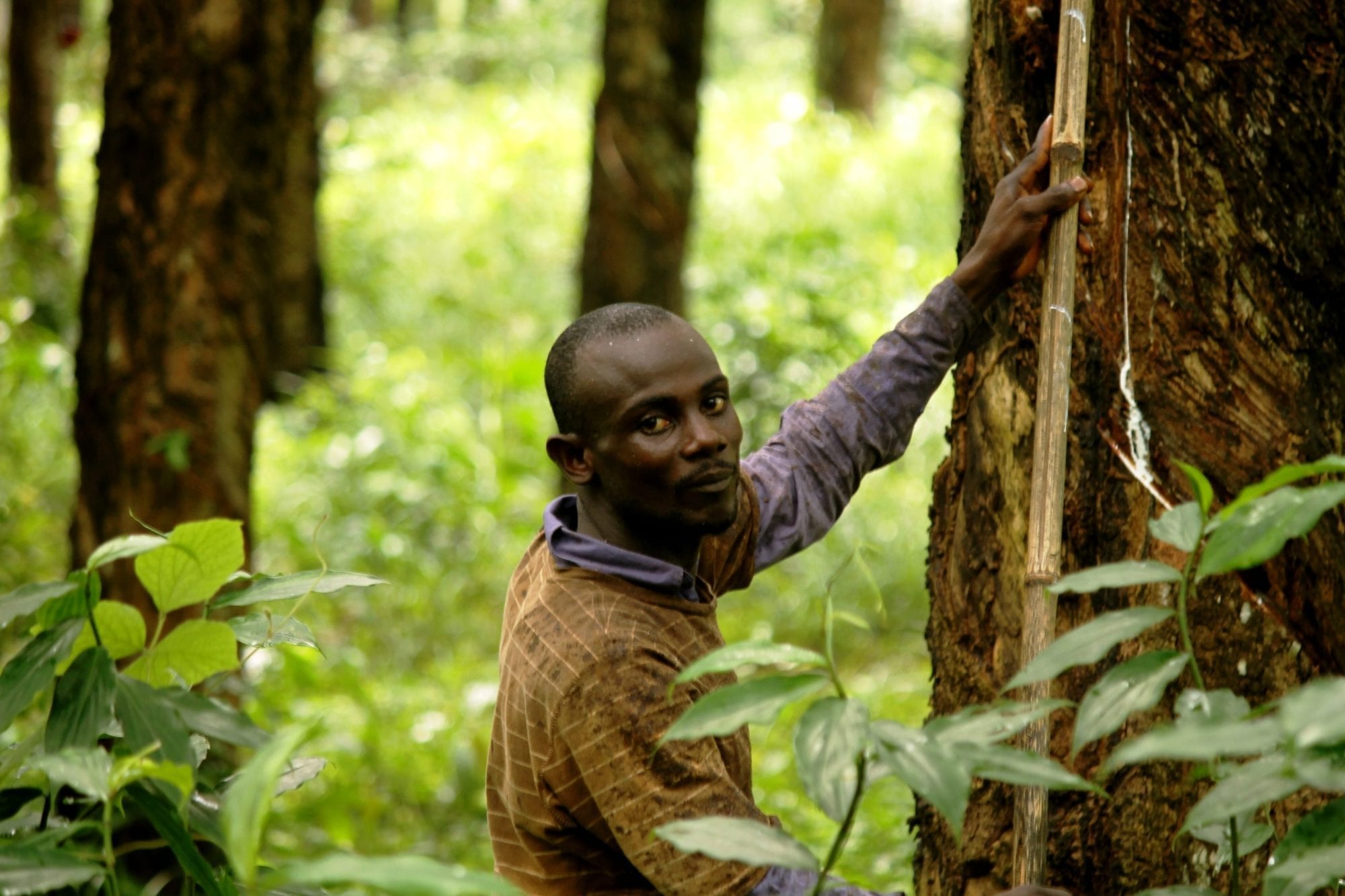
Opa Johnson, a rubber tapper on the Firestone plantation, is a member of the Firestone Agricultural Workers Union of Liberia, which negotiated work quotas that could be met without the need for children to assist their parents. Children also now receive free education as a result of union negotiations. Credit: Solidarity Center/B.E. Diggs
Even self-employed workers have organized to defend their right to decent work. The Zimbabwe Chamber of Informal Economy Associations (ZCIEA), a Solidarity Center partner, trains negotiators in collective bargaining with municipalities to provide adequate space for vendors and other informal workers throughout their cities.

Nyaradzo Tavariwisa makes and sells peanut butter to support her family. Credit: Solidarity Center/Jemal Countess
UNIONS HELP MAKE JOBS BETTER
Working people time and again have proven that when they are free to form and join unions and bargain for better working conditions, they can achieve decent work, improve their lives and benefit their families and communities.
In Peru, two unions, both Solidarity Center allies, represent palm workers on plantations and in processing factories. These unions have helped improve dangerous working conditions, access to healthcare and job stability through collective bargaining and labor inspections.

Peruvian palm oil workers travel across the plantation where they live and work. Credit: Solidarity Center/Oscar Durand
THE SOLIDARITY CENTER HELPS WORKING PEOPLE ATTAIN DECENT WORK
Decent work means employment that provides living wages in workplaces that are safe and healthy. Decent work is about fairness on the job and social protections for workers when they are sick, when they get injured or when they retire.
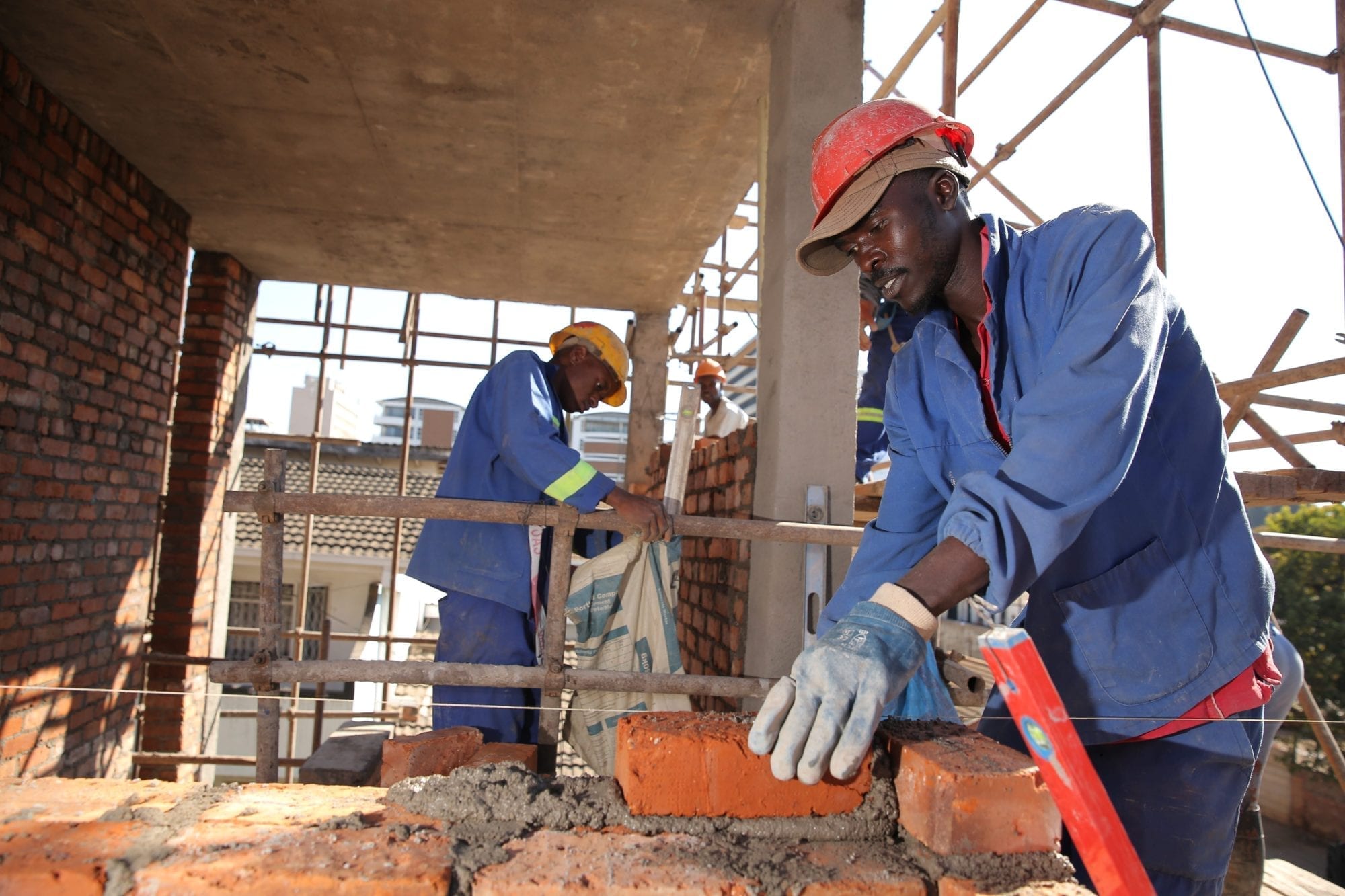
Jun 21, 2018
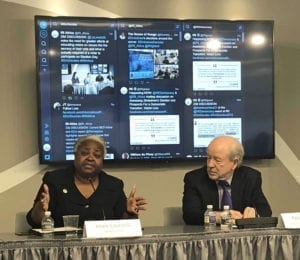
Solidarity Center Africa Regional Program Director Imani-Countess and NDI’s Patrick Merloe discussed challenges to democratic transition in Zimbabwe. Credit: Solidarity Center/Shayna Greene
Wage theft and other forms of economic injustice are among the major factors holding Zimbabwe back from a democratic transition, says Imani Countess, Africa regional program director for the Solidarity Center.
Countess spoke at a recent panel discussion in Washington, D.C., “Assessing Zimbabwe’s Election and Prospects for a Democratic Transition,” organized by the National Endowment for Democracy (NED). Bringing a labor perspective to the event, Countess described the strong correlation between increased participation in unions and the formation of other democratic institutions.
“There’s absolutely a link between democratic structures, the nature of unions and the role they play in the workplace, and in the nation and the fostering of broader democratic participation, particularly in elections,” says Countess.
Undemocratic practices flourish when workers are trapped in a cycle of economic inequality. Countess gave the example of 200 Zimbabwean women who experienced this type pf hardship firsthand after their husbands had not been paid for five years by the Hwange Colliery Co. Ltd. (HCCL). The company is one of the biggest in Zimbabwe, with the government as its largest shareholder.
Despite exporting to 13 nations including South Africa and China, HCCL owed its workers $70 million in unpaid wages. Often, companies will try to look attractive to foreign investors with competitive prices by engaging in forced labor and wage theft, Countess says.
Company’s Wage Theft Forced Families Turned to Informal Economy
The wives of the HCCL workers first protested in 2013 and were attacked by police. When they began protests again in 2018, they were joined by the Center for Natural Resource Governance, the National Mine Workers Union of Zimbabwe (NMWUZ) and the Zimbabwe Congress of Trade Unions.
Although the mine workers are not union members, Zimbabwe unions stood by the women because they were “the wives of workers,” says Countess. “So the National Union of Mine Workers was there.”
To help feed their families, the women took on informal jobs such as selling in markets and cross-border trading. About 94 percent of Zimbabweans work in the informal economy. Of the 6 percent working permanent jobs, one-third are exposed to wage theft, especially in the extractive sector, says Countess.
“For five years, these women subsidized the Hwange Colliery Co. by supporting their husbands’ ability to work without pay,” she says.
Civil society groups helped mobilize the women in their campaign through workshops on nonviolent strategies for resistance and other skills-building strategies, and opportunities to exchange experiences with women in other mining communities.
Finally, demands were met, ensuring that the women’s husbands were paid and not retaliated against for the actions of their wives.
This is only one example of how unions promote democracy in Zimbabwe despite the country’s challenges, says Countess. Though Zimbabwe is a militarized state with an unenforced constitution, union members are active in community organizations and serve in national election observation groups. For instance, in 2013, unions came together representing 15 countries in the Southern Africa Trade Union Coordination Council (SATUCC) region to participate in an observation mission in Zimbabwe.
“Mass-based organizations working together with communities can be powerful actors of change,” says Countess.
Also on the panel were Patrick Merloe, senior associate and director for Electoral Programs at the National Democratic Institute, and Elizabeth Lewis, deputy director for Africa at the International Republican Institute.
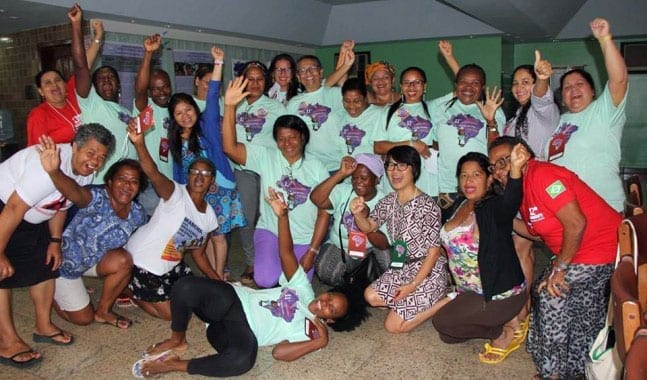
Feb 8, 2018
Following years of campaigning by domestic workers and their allies across Brazil, the government in recent days ratified the International Labor Organization Domestic Workers Convention (No. 189), a binding standard in which domestic workers are entitled to full labor rights, including those covering work hours, overtime pay, safety and health standards and paid leave. Brazil is the twenty-fifth country to ratify Convention 189 and the fourteenth in the Americas region.
Since the ILO passed the convention in 2011, the National Federation of Domestic Workers (FENATRAD), the National Confederation of Retail and Service Workers (CONTRACS) and the Central Union of Workers (CUT) were among unions pushing for its ratification, ultimately securing 1.2 million signatures urging the government to ratify the measure.
In a statement celebrating ratification, FENATRAD also vows to continue in the “daily struggle for dignity, valorization and recognition of domestic work, work that moves and creates conditions for other workers to dedicate themselves to productive activities.”
Brazil Economy Slumps as Labor Rights Attacked
The majority of the 7 million domestic workers in Brazil are women, primarily indigenous people and Afro-Brazilians. Brazil’s slumping economy has seen a sharp increase of workers in the informal-sector jobs, with 121,000 domestic worker jobs created between December 2014 and April 2017. At the same time, more than 3.2 million jobs were lost in the formal private sector and some 600,000 jobs lost in the public sector, according to the Department of Statistics and Socioeconomic Studies in Brazil (DIEESE).
Further, more than 9 million people have been pushed below the poverty line since 2015 and 800,000 Brazilians entered the ranks of the unemployed between January and August 2017.
Although workers are celebrating passage of the Domestic Workers Convention, they say a labor reform law passed last year severely weakens their fundamental rights on the job. The law in part dismantles provisions on overtime pay and working hours; creates new forms of precarious contracting, such as “zero-hour” contracts that do not guarantee a minimum wage; and permits pregnant women and breastfeeding mothers to work in unhealthy environments.
The law also disproportionately impacts historically disadvantaged workers, such as women and Afro-Brazilians, who earn less and are much more likely to be unemployed or underemployed than their white male counterparts.
“The convention is to guarantee decent work, unlike the new law that removes basic rights of the worker and the worker,” says Myllena Calazans, a lawyer with FENATRAD.
With Solidarity Center support, FENATRAD recently registered as a national federation, became a member of the International Domestic Workers Federation (IDWF) and is connecting with regional domestic worker organizations.
The Solidarity Center is also assisting the federation in education and outreach, including creation of a crossword puzzle magazine that informs Brazilian domestic workers about their rights. Many domestic workers spend numerous hours on public transportation commuting to and from work and do crossword puzzles during their commutes.
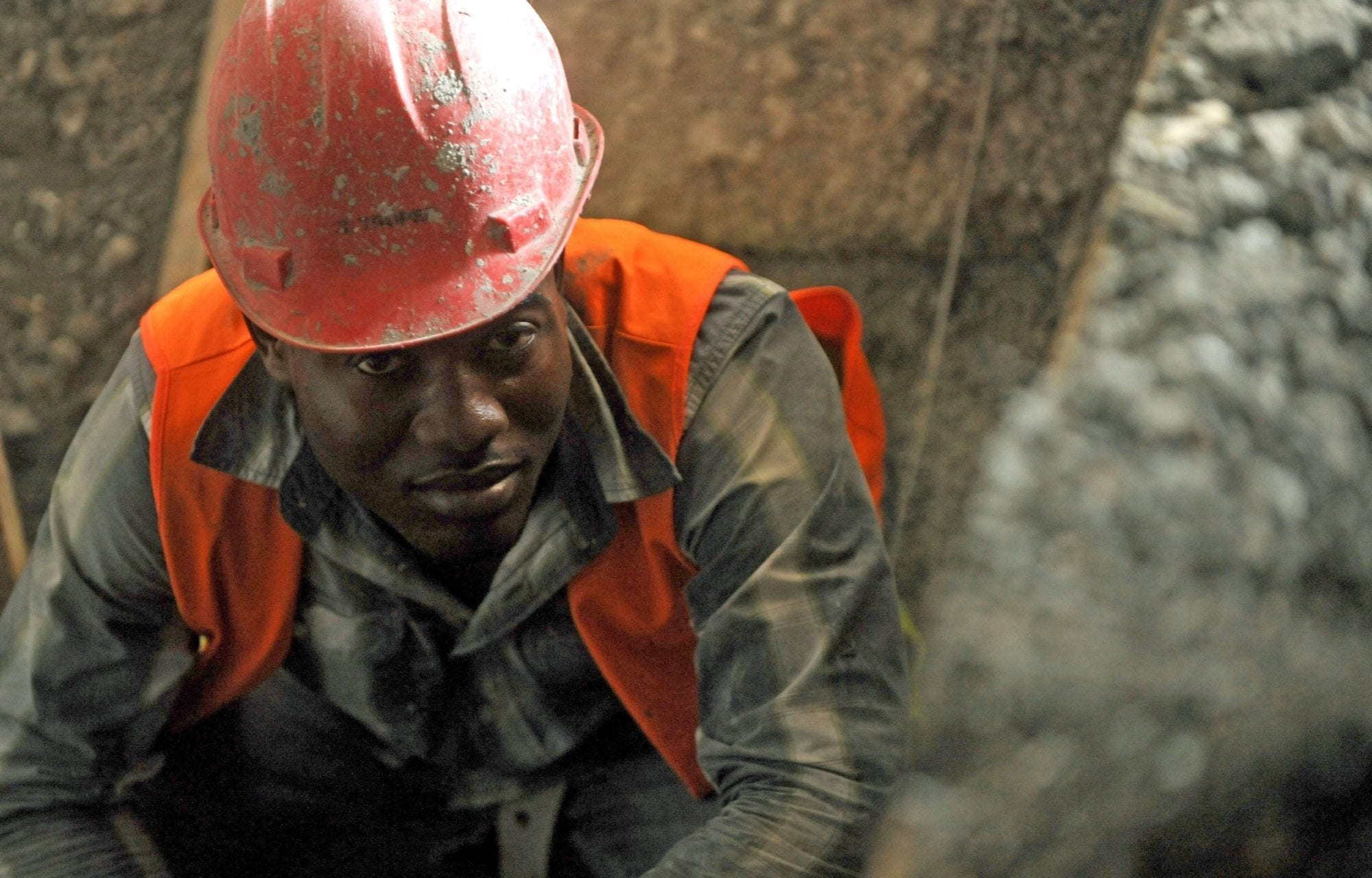
Nov 2, 2017
As the number of workers in the informal economy increase around the world, the result is that more and more workers are low paid, with few or no social benefits or job security. In the Dominican Republic, where many in the informal economy are Haitian migrants, the union movement successfully organized those who work in construction and, in the case of domestic workers, played a key role in pushing for passage of the International Labor Organization Domestic Worker Rights Convention 189.
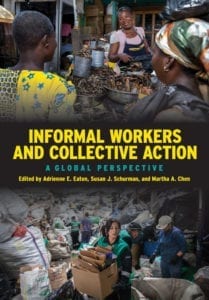 The Dominican Republic labor movement’s strategies for success will be among the examples discussed November 15 during the Solidarity Center launch of the new book, Informal Workers and Collective Action: A Global Perspective. (The event in Washington, D.C., is free. RSVP here.) The book collects case studies from union campaigns in such countries as Brazil, Cambodia and Colombia, bringing together in one volume a compendium of academic field research and concrete grassroots examples
The Dominican Republic labor movement’s strategies for success will be among the examples discussed November 15 during the Solidarity Center launch of the new book, Informal Workers and Collective Action: A Global Perspective. (The event in Washington, D.C., is free. RSVP here.) The book collects case studies from union campaigns in such countries as Brazil, Cambodia and Colombia, bringing together in one volume a compendium of academic field research and concrete grassroots examples
U.S. Rep. Pramila Jayapal (D-Wash.), AFL-CIO Executive Vice President Tefere Gebre, Solidarity Center Executive Director Shawna Bader-Blau and international worker rights advocates will explore how unions are using social and economic justice tools to organize workers and share their successes with others seeking dignity on the job, justice in their communities and greater equality in the global economy.
Celebrate Solidarity Center’s 20th Anniversary!
The book launch is part of the Solidarity Center’ daylong 20th Anniversary events, which include a festive celebration at Longview Gallery from 6 p.m. to 9 p.m., in Washington, D.C.
RSVP for the book launch here. Buy a ticket to the celebration here.
You also can become an event sponsor or make a donation to support the Solidarity Center’s next 20 years and stand with us to assert the fundamental rights of people at work!
Informal Workers and Collective Action was edited by Adrienne E. Eaton, Susan J. Schurman, Martha A. Chen and produced by Rutgers and WIEGO with support from the Solidarity Center.
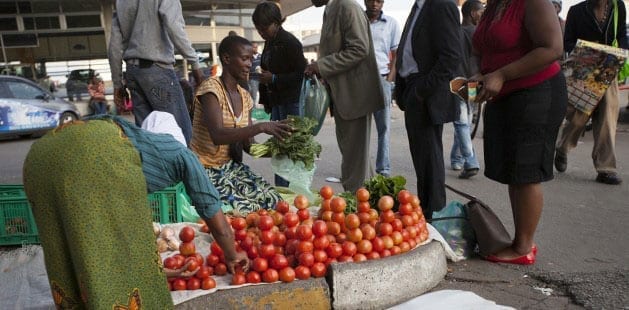
Oct 11, 2017
The government in Zimbabwe is moving to ban market vendors in Harare at a time when more than 90 percent of the workforce labors in the informal economy and 85 percent or more Zimbabweans are seeking decent work.
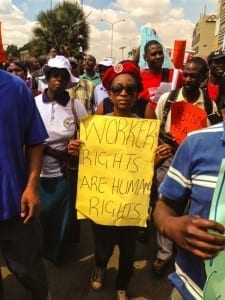
Zimbabweans are struggling for their fundamental right to earn a living. Credit: Thando Khoza
“People who are into street vending are not into it for their liking, but are being forced due to the collapsed economy,” the Zimbabwe Congress of Trade Unions (ZCTU) says in a statement.
“Instead of harassing vendors, the government must first of all restore economic growth and create the promised 2.2 million jobs. By doing so, all vendors will vanish overnight,” says ZCTU.
The Zimbabwe Chamber of Informal Economy Associations (ZCIEA), which represents some 200,000 members, has been seeking to address challenges identified by government and business in negotiations with the Harare central business district since January, and urges that “Operation Restore Order” ordered by the Harare City Council acting town clerk not be implemented.
“The laws and regulations which govern the informal economy are very much outdated and informal economy traders are always criminalized or termed illegal,” ZCIEA says in a statement. ZCIEA says the government’s designated vending sites are not accessible to customers because of their distance, and urges continued discussion among vendors and central business district representatives.
Since 2011, more than 6,000 companies have closed, leaving hundreds of thousands without employment. Even those with formal economy jobs are not paid on time, according to the Solidarity Center report, “Working Without Pay: Wage Theft in Zimbabwe.”

Zimbabwe street vendors also were targeted with eviction in 2016 and protested the move in Harare. Credit: Solidarity Center
Many people have turned to street vending after losing their jobs, and the 2.2 million market vendors now generate an average $3.96 billion in annual revenue. The number of market vendors also has increased because people are struggling to get by following a recent sharp hike in prices for basic goods.
The government waged a similar crackdown on market vendors in 2015, tearing down market stands and forcing vendors to pay high fees to set up stalls at government-approved sites.




















 The Dominican Republic labor movement’s strategies for success will be among the examples discussed November 15 during the Solidarity Center
The Dominican Republic labor movement’s strategies for success will be among the examples discussed November 15 during the Solidarity Center 

